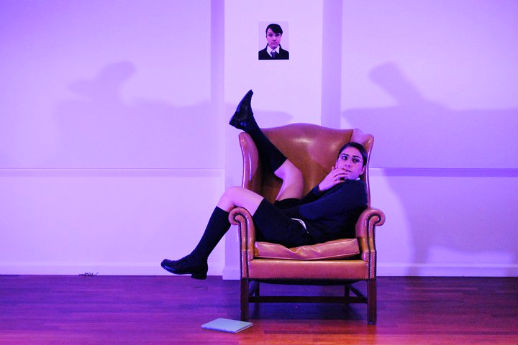

These seemingly disparate operas came together under Isabel Milenski’s direction, turning from the more usual fairytale presentation of Sortilèges to reveal adolescent traumas and awakenings, and bringing out the full terror of Debussy’s unfinished masterpiece.
Sortilèges is a bit of an oddity, written for a large ensemble of singing objects. The subject matter often suggests “children’s opera” (the concept has a certain similarity to Disney’s Beauty and the Beast) but the Pocket Opera took an entirely different approach. The Child in this production is closer to Sally Draper than Belle, living in an adult world that barely notices her. Solange Merdinian’s dusky mezzo beautifully inhabited the trouser roll of a child falling through the rabbit hole to an adolescent acid trip.
The simple stage design of the first part of Sortilèges (merely a chair and a picture) allowed the action to travel away from a fable to some much more disturbing fantasies. Treating Colette’s libretto abstractly, the Child barely destroys anything, merely ripping some pages from a book – instead the world around her misbehaves. The ensemble cast under the direction Wei-En Hsu and Yu Lee was quite strong, with special notice going to Shirin Eskandani as the boozy Mother, Ricardo Rivera as a masturbating Clock, and Lauren-Rose King as a whorish Fire.
As the stage began to fill with more props and actors when the action moved into the “garden,” however, the production began to lose focus. In the small space, the English words became less clear, and the poor sightlines of the makeshift theatre made it difficult to navigate the more complex tableaux. As the psychological journey ended, I found myself unsure of the final destination of the Child – her last word, a simple “Mama,” left me with a feeling of ambiguity.
A powerful rendering of La chute de la maison Usher followed. Edgar Allen Poe and Debussy are a perfect match, and even in this unfinished work, and the piece brims with the uneasiness and dread that pervades the source material. Milenski’s direction this time was more succinct, and the results payed off. The score does not translate as well to piano as did the Ravel, but the reduced forces also allowed the singers to attain an incredible intimacy with the audience, making every breath central to the drama.
The production relied on simple visual cues, putting the focus on the acting of the singers. Roderick Usher (Rivera) begins hidden in a chair turned away from the audience, while his sister Madeline (Tanya Roberts) wanders through the audience, and across the stage. Lucrecia Briceno’s lighting casts ominous shadows against the blank back wall, completing the gothic ambiance. Add Debussy’s chilling opening notes, and we are in the Usher manor.
As the Friend, Matthew Royal possessed a firm, clear baritone that established him as the voice of sanity, a sounding board for the other characters to react against. Clayton Okaly sang the part of the Doctor lyrically, but the lightness of his baritone and his youthful good looks both worked against him.
Roberts’ piercing soprano was perfect for the vocally brief part of Madeline. During her long, silent wanderings through the space, her harsh breathing and her hands scraping against the floors resonated in the space, creating a Poeish inequilibrium. Rivera deployed the intimacy of the room to shade his voice with a wide range of colors. His Usher began despondent, and quickly tipped over the brink of sanity, all the while maintaining clear diction.
Pocket Opera is a relatively new company, but I was impressed both by the vision of the regie, which allowed the ensemble to turn an undesirable performing space to their advantage, and the commitment of the singers. I’m excited to see what they come up with for Alcina in the Spring.


























Comments